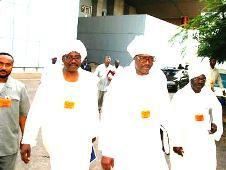Darfur talks stumble again as Sudan government rejects security proposal
ABUJA, Sept 8 (AFP) — African Union-sponsored talks on the crisis in Sudan’s Darfur region hit another hurdle as the Khartoum government rejected a draft protocol on the key issues of security and disarmament.
 “This draft, the way it had been prepared, contradicts obligations that we have already undertaken,” Sudan’s deputy foreign affairs minister Najeib Abdelwahab told AFP as the talks broke for recess.
“This draft, the way it had been prepared, contradicts obligations that we have already undertaken,” Sudan’s deputy foreign affairs minister Najeib Abdelwahab told AFP as the talks broke for recess.
“For example, this protocol speaks about reduction of forces while we have already taken a commitment to the UN to deploy police forces in Darfur so that law and order can prevail,” he said.
“We want an adjournment to enable us to properly study the draft and forward our observations to the mediators,” Abdelwahab said, adding that, in its current form, the draft protocol was unacceptable to Khartoum.
Nigeria’s President Olusegun Obasanjo, who is AU chairman, is “very likely” to meet the two opposing sides Thursday afternoon as part of his efforts to advance the peace talks, an AU official said.
The talks on the sensitive issue resumed late Wednesday almost four hours behind schedule, delegates told an AFP reporter covering the meeting.
“The new protocol glossed over four basic areas and unless it is further amended, it will not be useful at all,” the minister said.
“Firstly, the protocol has to be consistent with the Ndjamena agreement and to consolidate the implementation of the agreement,” he said, referring to a pact signed in April in the Chadian capital between Khartoum and Darfur rebels, who rose up against the government in February last year to protest at the economic and political marginalization of their region.
“Secondly, the protocol has to be consistent with the obligations of the government of Sudan as well as the July 30 UN Security Council resolution on the disarmament of the Janjaweed militia,” he added.
The Janjaweed are the pro-Khartoum militia allegedly given a free rein by Khartoum when Darfur plunged into civil war 19 months ago to crack down on the native black African population.
The Arab militia has been accused of committing atrocities against civilians, of conducting a scorched earth policy, and of the widespread rape of women.
The UN resolution gave the government in Khartoum a 30-day ultimatum to disarm the Janjaweed.
On September 1, a day after the UN deadline had lapsed, UN Secretary General Kofi Annan condemned Khartoum for having neither disarmed the Janjaweed nor stopped attacks against civilians.
Abdelwahab also said the protocol has to clearly define the obligations of each party to the conflict so that both sides know what their obligations are, and should define the Janjaweed “so that the government will know how and where to disarm them.”
Khartoum has, however, accepted that the future and status of the rebel forces fighting it in Darfur — the Sudan Liberation Movement (SLM) and the Justice and Equality Movement (JEM) — should not be discussed at this stage of the talks but as part of a comprehensive political settlement.
The leader of the rebel SLM negotiating team, Shariff Harir, said Khartoum’s demands were proof it was not sincerely committed to working for peace in Darfur.
“The Sudanese government is not serious. As can be seen by the international community… these points are a bunch of nonsense. The UN is clear about the fact that the Janjaweed have to be disarmed by the government of the day,” Harir said.
“The AU in July has made that point very clear. In September, the UN report indicted the government for failing to do so. So the two bodies have known how the Janjaweed should be disarmed,” he added.
He also accused the government of not respecting a ceasefire signed at talks in Ndjamena in April.
“They continue to kill civilians in Darfur thereby violating the ceasefire agreement,” he alleged.
SLM spokesman Abdelhafiz Mustafa Musa commended the AU protocol but noted that it needed to include other issues, such as the withdrawal of government troops from Darfur and checks on the Janjaweed.
“The issue of an independent international body to probe the atrocities in Darfur and bring the perpetrators to justice should also be looked into,” he added.
“Our main concern is the deplorable humanitarian crisis in Darfur. The enabling environment should be created for the people to return home and for the aid agencies to have access to the affected areas,” he added.
The Abuja talks began on August 23 and are aimed at resolving the Darfur crisis which has killed an estimated 50,000 people and forced another 1.4 million to flee their homes. But in three weeks, the talks have made little headway.
Last week, the talks were deadlocked over how to solve the humanitarian problem in the crisis-ravaged Darfur region. An accord on the issue was finally struck last Wednesday following pressure from the AU and Nigerian mediators.
